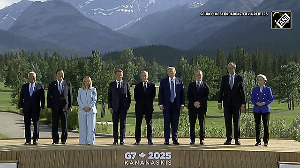 India witnessed a sharp fall in the inflow of foreign direct investment after 2008, when the global financial crisis pulled down demand overseas, and the current exercise to liberalise FDI policies is aimed at reversing the fall.
India witnessed a sharp fall in the inflow of foreign direct investment after 2008, when the global financial crisis pulled down demand overseas, and the current exercise to liberalise FDI policies is aimed at reversing the fall.
However, two Delhi-based researchers have found the fall is not as acute and is magnified because the government wrongly included funds like private equity, which are more in the nature of portfolio investments, in the FDI category.
FDI is essentially long-term investments that come with added benefits such as better technology, management and marketing assistance, says the study.
The researchers -- K S Chalapati Rao of the Institute for Studies in Industrial Development and Biswajit Dhar, director of Research and Information System for Developing Countries -- feel that segregating investments like private equity, venture capital and hedge funds, and round-tripped investments from FDI will help India plan its FDI policy better.
The study -- India's FDI inflows, trends and concepts -- tracked 2,748 FDI inflows, each amounting to $5 million or more during September 2004 to December 2009 that came through the Foreign Investment Promotion Board and Secretariat for Industrial Assistance approval route, automatic route and acquisition of existing shares of Indian companies by foreign investors.
These inflows covered an investment of $80.92 billion, or 87.6 per cent of the total inflows worth $92.36 billion reported for the five-year period.
According to the criteria followed in the study, less than half of these inflows was termed as FDI.
What has been characterised as private equity and venture capital investments accounted for almost 27 per cent, while round-tripping variety came to about 10 per cent.
Other portfolio investments were a little more than nine per cent and non-residential-Indian investments about five per cent.
The researchers argue the sharp decline in FDI inflows was caused due to the dip in inflows in several other categories considered as pure financial investments and not the ones that are FDI in a true sense.
"It can be seen further that it is the portfolio investments comprising PE/VC/HF, NRIs and Other Portfolio types which declined sharply in 2009 while there was only a slight dip in what can be termed as realistic FDI inflows.
"In contrast, total round-tripped investments registered a marginal increase," the report said.
The study said 70 per cent of the inflows were through tax havens.
Shares of PE investments increased to 22.2 per cent in 2009 from a mere 4 per cent in 2001, it noted.
The report also underlined the fact that the FDI route had become a major channel for domestic entrepreneurs to avoid taxes and increasingly ambiguous sources, leading to abnormal flow of funds.
Hence, the need of the hour was a reliable data system with detailed analysis of operations of a representative set of Indian firms, including FDI entities, it said.
According to researchers, the development which provides a specific context to the present study is the sharp decline in the total FDI equity inflows reported during the first eight months of 2010-11 by 23.88 per cent over the inflows of the corresponding period of 2009-10.
"The major fall in FDI inflows has caused concern in policy making circles and has become a subject matter of public comments.
The Reserve Bank of India is now worried about the fall in FDI inflows in the context of higher level of current account deficit and dominance of volatile portfolio capital flows," they noted.
According to a senior commerce ministry official, total FDI inflows in the current financial year (2010-11) might come down by $5 billion to around $20-22 billion.
This is mainly due to a lagged effect of the FDI decisions taken a couple of years ago.
"Investment decisions typically take 18 months to fructify.
"This year is a reflection of the decisions taken by foreign companies two years ago, which was in thick of recession," the official told Business Standard, declining to comment on the specifics of any independent study.












